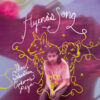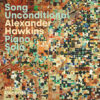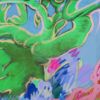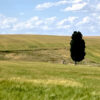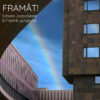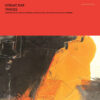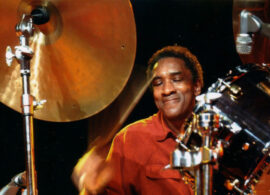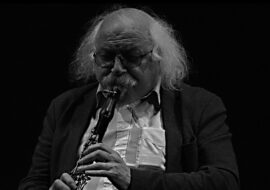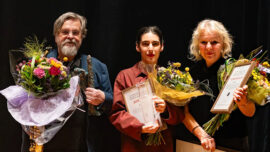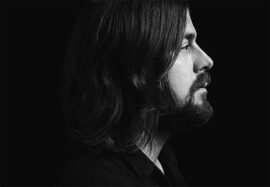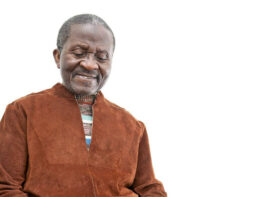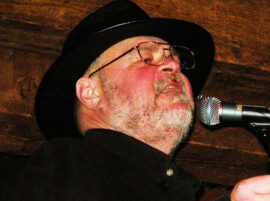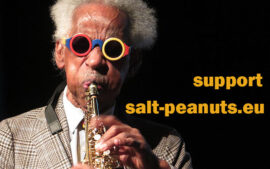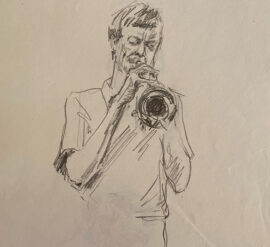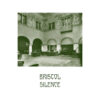
Bristol Silence is the first album of the American, Oslo-based double bass player-composer John Andrew Wilhite as a bandleader, and it is a most impressive, monumental work, addressing one of the darkest eras in Norwegian history, the passivity and complicity with the German Nazi occupation during World War II.
Wilhite, who studies with double bass masters Reggie Workman and Håkon Thelin, and plays in Andreas Røysum Ensemble, tells the story of the Bristolorkestret – Bristol Orchestra (which later became the Norwegian Radio Orchestra, KORK, a central organ for Norway’s national musical identity, which some of its founders were resistance fighters, while others recorded Nazi propaganda music) – that played music for the Nazis at Oslo’s Hotel Bristol. But it is not a work about the past and the silence that surrounds it, but a work that lets this silence speak, sing, and scream, reaching our current time. «The silence of the complicit and the ‘apolitical’, the silence of the repressed and the imprisoned, the silence of the absent and the murdered, the silence of the conspirator and of resistance, of refusal», in Wilhite words. It raises complex moral questions and does not offer comforting answers, but demands that we act and take responsibility.
Wilhite assembled an all-star ensemble with the same instrumentation of the original Bristol Orchestra, with soprano vocalists Sofia Jernberg and Burmese-American Robin Steitz; a horn section of trumpeter Erik Kimestad Pedersen, alto sax and clarinet player Klaus Ellerhusen Holm, clarinet and flute player Andreas Røysum, and tenor sax player Torben Snekkestad; string section of violinist Hans P. Kjorstad, guitarist Ferdinand Bergstrøm, and Wilhite himself as conductor and playing the double bass; pianist Ayumi Tanaka; drummer Andreas Winther and percussionist Ane Marthe Sørlien Holen. The album was recorded at Athletic Sound in Halden in August 2024. The album is accompanied by an essay by Derek Baron and visual material by Gregory Blake, who has reworked historical images of Hotel Bristol to remove all human figures, as an echo of the musical concept. The album also includes the libretto, delving into the layers of meanings and references. The album was released on May 8, Liberation Day in Norway, celebrating the end of the Nazi occupation during WWII.
Bristol Silence is structured like a contemporary, lyrical song cycle that explores different aspects of the toxic silence through surprising, thought-provoking connotations between poems, songs, and stories, and a masterful performance of the ensemble. It opens with an old recording of the Bristol Orchestra itself, slowly stripped away until only the surface noise remains. Then, Wilhite’s ensemble plays this silence, harmonizing and amplifying it, suggesting that «the silence behind the music» is the focus of this provocative piece. The following «Vår kveld» (Our evening) was inspired by Norwegian modern poetess Gunvor Hofmo’s poem from 1943, «Vårkveld» (Spring Evening), months after her closest friend and lover, the Austrian-Jewish writer and refugee Ruth Maier, was arrested by Norwegian police and deported to Auschwitz. Jernberg and Steitz’s reserved emotional delivery captures faithfully the terrible feeling of losing a loved one and the numbing pain. The playful «Stumpiano» was inspired by the story of renowned pianist Robert Riefling, who was imprisoned for helping Jews escape to Sweden, and during his time in prison, he could play only on a piano without strings, only the hammer mechanism, but used this silent piano to produce noisy industrial sounds as a quiet defiance and secret resistance against the enforced silence.
Wilhite’s solo double bass introduces the three-movement «As Many Sighs», borrowing an entertaining text from Giacomo Puccini’s opera Tosca, which was staged by the Deutsches Theater in Oslo in October 1942, just a month before Ruth Maier was deported. Cleverly, it suggests a subversive realization of the text, as the performers question whether they are entertainers or prisoners. «In Every Morning» takes Bertolt Brecht’s ironic poem from Hollywood Elegies as a tribute to Henry Gleditsch, the theater director at Trøndelag Teater, who wrote a play satirizing Norwegian businessmen who grew rich by collaborating with the Nazis. He was executed in the forest outside Trondheim, also in October 1942.
«But Your Eyes Said» is inspired by American singer-actor Joseph Santly’s «Your mouth says no no (but your eyes say yes)», sung during the war by Bristol Orchestra’s vocalist, Arne Sveen, who was also a member of the Norwegian resistance. In another context, this song may sound like a lewd, even creepy, Tin Pan Alley cliché. Here it is turned upside down, memorializing the resistance plans to sabotage the railway, as the soprano voices are interrupted by the ensemble’s vague, toneless noise, stressing that sometimes, what is left unsaid means the most. This thoughtful work ends with «Every Last Breath», built around a poem by Afro-American poet and scholar Fred Moten: «Every last breath / We want to breathe somebody / So beautiful in refusing». The silence here is an agitation, a disturbance, a wounded attempt at articulated intent.
Eyal Hareuveni
Sofia Jernberg (soprano), Robin Steitz (soprano), Erik Kimestad Pedersen (trumpet), Klaus Ellerhusen Holm (alto saxophone, clarinet), Andreas Røysum (clarinet, flute), Torben Snekkestad (tenor saxophone), Hans P. Kjorstad (violin), Ferdinand Bergstrøm (guitar), Ayumi Tanaka (piano), Andreas Skår Winther (drums), Ane Marthe Sørlien Holen (percussion), John Andrew Wilhite (double bass)

